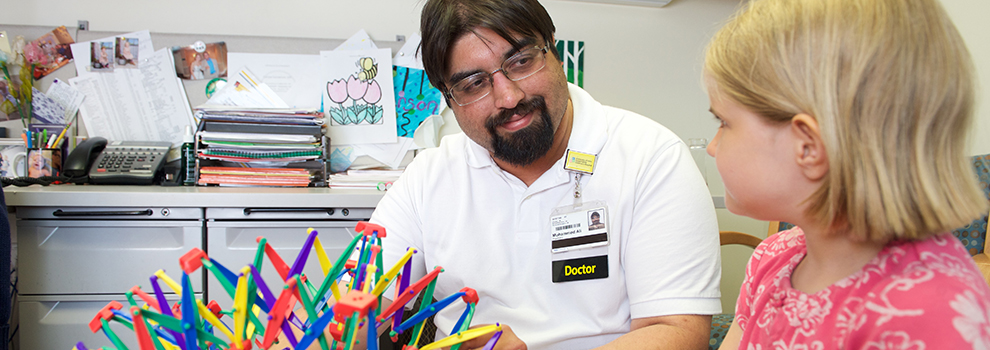
First Year
- 7 blocks Child and Adolescent Psychiatry Outpatient Clinic
- 4 blocks Child and Adolescent Psychiatry Inpatient Unit
- 1 blocks Pediatric Neurology Outpatient Clinic
Second Year
- 7 blocks Child and Adolescent Psychiatry Outpatient Clinic
- 4 blocks Consultation-Liaison/Emergency Psychiatry Service
- 4 blocks School and Community Consultation (half day per week)
- 1 blocks Center for Disabilities and Development (developmental pediatrics)
View the ![]() schedule as a table.
schedule as a table.
Clinical Rotations
Training in child and adolescent psychiatry at the University of Iowa will encompass the requirements set forth by the American Board of Psychiatry and Neurology Residency Review Committee. The two-year subspecialty training in the child and adolescent psychiatry program will include both outpatient and inpatient rotations, exposing residents to a wide range of clinical problems of varied complexity as well as in-depth experience in the psychiatric care of children and adolescents. During their two-year subspecialty training, the child and adolescent residents are not required to take call.
Child and Adolescent Psychiatry Outpatient Clinic
In the Child and Adolescent Psychiatry outpatient clinic, residents see a variety of new diagnostic evaluations while maintaining a continuity of care follow-up clinic. Diagnostics are comprehensive evaluations, which are either completed as part of a multidisciplinary team that include psychology, education, and speech-language pathology or as physician-only exams with the option of referring on to the multidisciplinary team. A mixture of medication management and psychotherapy patients are followed by each resident as part of the continuity of care follow-up clinic experience.
Child and Adolescent Psychiatry Inpatient Unit
The Child and Adolescent Psychiatry Inpatient unit is a 15-bed facility with children ranging in age from 3 to 17 years old. While assigned to the inpatient unit, residents participate in multidisciplinary rounds each day, attend family meetings, and assess newly admitted patients. Group and individual therapy are available to patients, as well as educational support and recreation therapy.
Consultation-Liaison Psychiatry Service
Residents on the Consultation-Liaison Psychiatry Service learn about and treat the wide variety of psychiatric disturbances that occur among medically ill children and adolescents while consulting and collaborating with their non-psychiatric peers. Common referral sources include Pediatric Neurology, Pediatric Hematology-Oncology, and General Pediatrics.
School and Community Consultation
During the School and Community Consultation rotation, residents:
- Participate in a weekly multidisciplinary triage team meeting at a local junior high school
- Observe classrooms including a specialized youth program for autism spectrum youth
- Observe and interact with children in the preschool setting under the supervision of an on-site developmental psychologist
- Provide general information about the variety of psychiatric disorders that have an impact on children’s abilities to function in the school setting and assist the team in assessing the need for further referral
- Have the opportunity to observe a community-based treatment program
Pediatric Neurology Outpatient Clinic
In the Pediatric Neurology Outpatient Clinic, residents see new and existing patients with diagnoses in areas such as neuromuscular disorders, seizure disorders, muscular dystrophies, and degenerative disorders. Residents also have the opportunity to participate in outreach clinics in surrounding communities.
Center for Disabilities and Development
In this specialized second year rotation, residents are supervised by developmental pediatricians, behavioral psychologists, and a pediatrician who is board-certified in child abuse and neglect. Residents also work closely with an accomplished group of behavioral therapists and learn about functional behavioral analysis from a national expert.
Residents participate in a number of clinical areas while rotating at the Center for Disabilities and Development, including multidisciplinary developmental evaluations, biobehavioral evaluations, Child Protective Service evaluations, and other specialty services.